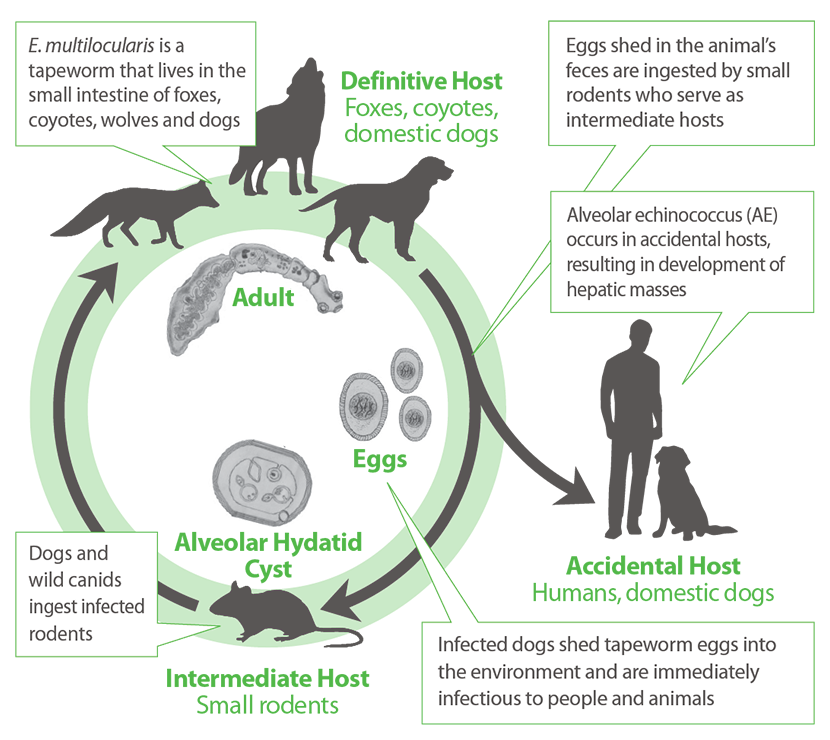An aggressive “tumour like” tapeworm is on the rise in Alberta and Ontario, experts warn.

Fox or coyote tapeworms (they are called fox tapeworms in Europe), have been found in foxes, coyotes, dogs and lemurs — posing a threat to humans in these provinces.
Dr. Andrew Peregrine, a veterinary parasitologist from the University of Guelph, tells Global News the parasite, or Echinococcus multilocularis, is not like other tapeworms.
“It behaves like an aggressive tumour, killing the rodent… it’s still brand new for Ontario. Prior to 2012, we didn’t have it.”
READ MORE: Alberta scientists warn spread of deadly tapeworm found in coyotes
Peregrine says there have been five cases of fox tapeworms in dogs in the Golden Horseshoe region of southern Ontario and one near northwest Ottawa. He adds there have also been two lemurs that have died in the province’s Niagara area and a third lemur that has recently been diagnosed with the parasite.
“The reason this is a public health concern is what happens in lemurs, this parasite does what it does in rodents and causes liver damage,” he explains, adding when humans and dogs pick up the parasite, their livers are often the first target. He adds in the past, infected animals didn’t have to be reported, but in July, Ontario has now made reporting mandatory.

Get weekly health news
How the parasite travels
The tapeworm lives in the small intestines of animals like foxes, wolves, coyotes and domestic dogs, he adds. Eggs are shed in the animal’s feces, and are eaten by small rodents or sometimes even dogs. Humans and dogs would be considered “accidental hosts,” which would suggest why the parasite acts aggressively compared to other animals.
Humans become infected when they digest the eggs — often from their dogs who eat infected rodents or dogs that may digested infected feces. “Washing hands regularly eliminates the risk.”
When a human is infected, the tapeworm makes its way into the liver, invading it and causing pain. Things work differently in dogs, he adds, and often symptoms are more subtle.
Peregrine adds if a human is infected, symptoms can range from pain in the abdominal area or liver. “It is treatable, the earlier they catch it,” he continues. “The chance of you being alive 10 years after being diagnosed, however, is six to 25 per cent.”
Human cases
Heath experts in Alberta are also concerned about the parasite spreading to humans. The University of Alberta’s infectious diseases expert Stan Houston told Global News last week there have been four human patients with the tapeworm in the last four years.
“The only previous Canadian case was in 1928 in Manitoba. This is significant enough to warrant a watchful eye on the problem,” he said. “Roughly one-third of patients who are diagnosed are jaundiced. Another third report unspecified pain and see a doctor for that reason. The other third will visit a doctor for another reason and through an ultrasound or CT scan, a liver mass is identified.”
Experts believe the strain was brought to Alberta through a dog from Europe.
READ MORE: Crippling, metre-long parasitic worms are nearing eradication, officials say
Previous reports have also indicated at least 12 cases of the tapeworm in humans in Canada, but some of those patients may not have been in the country during the infection, Bayer Animal Health Canada notes.
Bayer adds infections can also spread to the lungs, brain and other organs, and some patients won’t even know they are infected for up to 15 years. Peregrine adds there are treatment options available, including chemotherapy or removal of the actual worm from the organ.
Warning to all Canadians
And because the parasite is still considered emerging, it’s hard to predict exactly how many humans and pet dogs will get infected this summer. Experts say it’s important to be educated about the parasite, rather than avoiding the outdoors altogether.
The best thing all pet owners can do (besides washing their hands), is talking to your local veterinarian to find out if there have been other cases of fox tapeworm.
READ MORE: Woman complains of ‘electric shocks’ in legs, doctors find tapeworm larvae wriggling in spine
“If you have an outdoor dog, wash your hands before you eat… it’s a simple thing.”
— with files from Slav Kornik.









Comments
Want to discuss? Please read our Commenting Policy first.